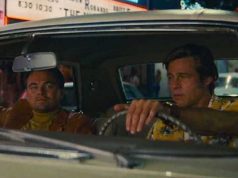It is a dangerous time for “The Aviator” to be released. Many biopics are already in theaters, and “The Aviator,” telling the story of full-time billionaire and part-time madman Howard Hughes, is apt to seem exactly like them.
To be honest, it IS a lot like them; biopics have become the new romantic-comedy, the genre where certain things ALWAYS happen, and where you go along with it because hey, it’s a biopic. But this one is directed by Martin Scorsese, and while it is far from his best work, it is polished and opulent and clearly the product of a skilled filmmaker. His movies tend to look like they were expensive, but they also tend to look like they needed to be.
It begins, as do most biopics, with a “significant” moment from the subject’s childhood: in this case, young Howard being bathed by his mother, who coos about the danger of germs and illness. Bathed at age 9 (or so) by his mother? In a vast, dark room? And being warned against germs? Thus are the seeds of insanity sown.
We skip ahead some years to 1927, when Hughes (in a confident performance by Leonardo DiCaprio), heir to his parents’ Texas fortune, has decided he’s a filmmaker. He’s been shooting “Hell’s Angels,” a war epic, for a year. He delays for months because he needs for there to be clouds for the airplanes to fly past, in order to give the audience some idea of the planes’ speed. He finally gets his clouds and finishes the film, but by then Hollywood has entered the Sound Era. So he reshoots the whole thing for sound. The total cost is some $4 million, an obscene amount in Depression-Era terms.
Hounded and worried by his financial advisor Noah Dietrich (the reliable John C. Reilly), and often abetted by a meteorologist (Ian Holm) upon whom he sometimes foists other duties, Hughes is a larger-than-life figure who dates starlets and wastes money. He has a fascination with aviation, and when TWA doesn’t want to build the plane he’s designing, he buys TWA. He’s the epitome — perhaps the prototype — of the frivolous Texas billionaire.
The film is at its best when it focuses on the relationship between Hughes and Katharine Hepburn, played to gorgeous, patrician perfection by Cate Blanchett. Hepburn was known to shower seven times a day, among other obsessions; she could relate, on some level, to the quirks of Howard Hughes. In the film they are a fine pair, tolerating and complementing each other even when his down-home Texas ways don’t blend with the mannerisms of her Connecticut family. He’s mildly deaf at times (a fact that comes and goes over the course of the film), but he can always hear Katharine.
(As for Cate Blanchett, if this is not the supporting performance of the year, I don’t know what is. She captures Katharine Hepburn’s beauty, intelligence and mystique magnificently, presenting a character that is not just a fine impersonation but a genuine person, too. If a film is ever made about Ms. Hepburn, here’s your star.)
Less compelling is Hughes’ subsequent relationship with Ava Gardner (Kate Beckinsale). Perhaps Ava Gardner was simply not as interesting as Katharine Hepburn, or perhaps Kate Beckinsale is no Cate Blanchett. Whatever the case, Gardner barely registers as a real person, much less a person with any connection to Howard Hughes. Watching the film, I constantly wished Hughes would dump Gardner and get back with Hepburn, even though Hepburn was by now in love with Spencer Tracy, and I would certainly never want to break them up. So you see my dilemma.
Scorsese earns his money as a director in a sequence in which Hughes is nearly killed while test-piloting a new plane. The scene is frightening, fiery and superbly assembled, a visceral reminder of Scorsese’s decades of practical experience in making movies that affect the viewer.
The rest of the film is eminently watchable and often very entertaining. It benefits from fine supporting performances by Alec Baldwin as Pan-Am chief Juan Trippe (Hughes’ main competitor in the airline business) and Alan Alda as the corrupt senator in Pan-Am’s pocket, plus spicy tiny performances by the likes of Edward Herrmann, Willem Dafoe, Brent Spiner, Jude Law and Frances Conroy (“Six Feet Under’s” Ruth Fisher, here playing Katharine Hepburn’s mother like she was born into it).
As Hughes becomes more paranoid and delusional and less able to deal with his obsessive-compulsive disorder, DiCaprio kicks his performance into high gear, bringing out the man’s oddities, ambitions and basic humanity all at once. DiCaprio is so youthful-looking that even with a mustache and makeup he never convinces me that Hughes is more than about 20 years old — but it is a testament to DiCaprio’s ability that such matters almost become irrelevant in the final analysis. He gained legions of detractors with “Titanic,” and he seems doomed to forever fight against them, but “The Aviator” is strong evidence in his favor, if you give the guy a chance.
The movie is lavish and big, fully meeting the demands of Howard Hughes’ lavish, big life. If it fits too easily into the mold of biopics, and if its lengthy running time feels too rambling, well, you overlook that. This is grand Hollywood entertainment in the old-school style, so glistening and dazzling that its flaws are washed away in a sea of glitter.
B (2 hrs., 49 min.; )





